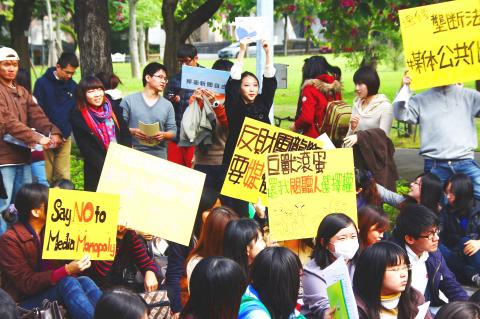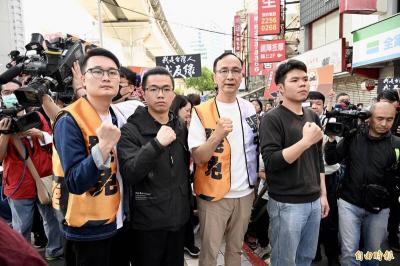National Communications Commission (NCC) Chairman Howard Shyr (石世豪) yesterday said the commission’s ruling on Want Want China Times Group’s purchase of cable TV services owned by China Network Systems (CNS) remain unchanged and that the transaction would not take effect until the group fulfilled each and every requirement issued by the commission.
Shyr made the comments during a review at the legislature’s Transportation Committee of how Want Want China Times Group plans to fulfill the requirements.
The preconditions include that group chairman Tsai Eng-meng (蔡衍明) and his family members, as well as his business associates in the deal, must completely dissociate themselves from the operation of CtiTV News. In addition, China Television’s (CTV) digital news channel must be turned into a non-news channel. As a TV network, CTV must have an independent editorial system as well.

Photo: Lin Yi-chang, Taipei Times
“The commission has already ruled on the case [Want Want-CNS deal] and the ruling has already been delivered [Want Want],” Shyr said. “Both the group and the commission are bound by the ruling.”
Shyr confirmed that the group has already filed an administrative lawsuit against the commission over these requirements.
Despite the pending lawsuit, the group still needs to fulfill these requirements for the transaction to take effect, he said.
Taiwan Solidarity Union Legislator Hsu Chung-hsin (許忠信) asked if the Tsai family could place the shares they own in CTiTV News under a third-party trustee to meet the commission’s requirement. Shyr said the method may only change the nominal ownership of the asset, adding that the commission will determine if Tsai has indeed cut off his relations with CTiTV News.
President Ma Ying-jeou (馬英九) said on Tuesday during the release of the nation’s first human rights report in English that he did not want the media in the nation to present only one viewpoint.
Hsu asked Shyr for his views on Ma’s remarks, adding that his personal interpretation was that Ma did not want Taiwan to become a “heaven for pro-China opinions.”
Hsu said the issue of China’s acquisition of Taiwanese media should be addressed as a matter of national security.
In response, Shyr said the last thing a democratic country wanted was to have its media convey only one viewpoint.
Should the media acquisition involve national security issues, the commission would work closely with relevant government agencies, he said.
Chinese Nationalist Party (KMT) Legislator Yang Li-huan (楊麗環) asked Shyr if he thought that certain groups have indeed monopolized the operations of the nation’s media outlets. Shyr said that owning more media outlets gives a media group more economic power. However, he said that that this did not mean that the group could have absolute control over the expression of public opinion.
“Public opinion in Taiwan is very diverse and has multiple ways to be expressed,” he said. “The student protests against media monopolization, for example, were organized through online media.”
Shyr also said that research on media monopolization mainly focused on whether it hindered exposure to certain opinions or news, or how the media group utilizes the advantage to create certain trends.

The Ministry of Economic Affairs has fined Taobao NT$1.2 million (US$36,900) for advertisements that exceeded its approved business scope and ordered the Chinese e-commerce platform to make corrections in the first half of this year or its license would be revoked. Lawmakers have called for stricter supervision of Chinese e-commerce platforms and more stringent measures to prevent China from laundering its goods through Taiwan as US President Donald Trump’s administration cracks down on origin laundering. The legislature’s Finance Committee yesterday met to discuss policies to prevent China from dumping goods in Taiwan, inviting government agencies to report on the matter. Democratic Progressive Party

Taiwan and its Pacific ally Tuvalu on Tuesday signed two accords aimed at facilitating bilateral cooperation on labor affairs, according to Taiwan’s Ministry of Foreign Affairs (MOFA). The governments inked two agreements in Taipei, witnessed by Foreign Minister Lin Chia-lung (林佳龍) and visiting Deputy Tuvaluan Prime Minister Panapasi Nelesone, MOFA said in a news release. According to MOFA, the agreements will facilitate cooperation on labor issues and allow the two sides to mutually recognize seafarers’ certificates and related training. Taiwan would also continue to collaborate with Tuvalu across various fields to promote economic prosperity as well as the well-being of their

The Taipei District Prosecutors’ Office has continued its investigation into allegations of forged signatures in recall efforts today by searching the Chinese Nationalist Party’s (KMT) city chapter and questioning several personnel including the chapter director, according to media reports. Among those questioned and detained were KMT Taipei chapter director Huang Lu Chin-ju (黃呂錦茹), chapter secretary-general Chu Wen-ching (初文卿), chapter secretary Yao Fu-wen (姚富文) and first district committee executive director Tseng Fan-chuan (曾繁川). Prosecutors said they would not confirm reports about who had been summoned. The investigation centers on allegations that the ongoing recall campaigns targeting Democratic Progressive Party legislators Rosalia Wu (吳思瑤)

Several Chinese Nationalist Party (KMT) officials including Chairman Eric Chu (朱立倫) are to be summoned for questioning and then transferred to prosecutors for holding an illegal assembly in Taipei last night, the Taipei Police said today. Chu and two others hosted an illegal assembly and are to be requested to explain their actions, the Taipei City Police Department's Zhongzheng (中正) First Precinct said, referring to a protest held after Huang Lu Chin-ju (黃呂錦茹), KMT Taipei's chapter director, and several other KMT staffers were questioned for alleged signature forgery in recall petitions against Democratic Progressive Party (DPP) legislators. Taipei prosecutors had filed